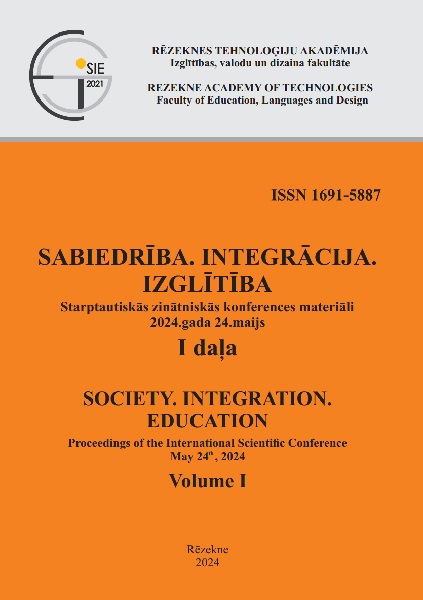CONTEMPORARY PROJECT MANAGEMENT AND ITS ADDED VALUES IN EDUCATIONAL INSTITUTIONS
DOI:
https://doi.org/10.17770/sie2024vol1.7910Keywords:
core values, project management, project management implementation methodsAbstract
In the field of education, with the advancement of cutting-edge technologies and the emergence of new challenges and solutions in the education sector, coupled with increasing globalization, competition, personal ambitions, new ideas are increasingly emerging, and opportunities for their realization are sought. Professional and successful project management facilitates the development of new ideas, their implementation in both public and private sector educational institutions. To achieve the goals set in the project, it is essential to determine the core values that should be adhered to throughout the process. The parties involved in the project need to understand what the project is, its elements, the process to achieve desired results, the risks involved, who the project manager is, and his team, among others.
The core values in projects implemented in educational institutions may vary depending on the industry in which the project is implemented, the project's goals, and implementation methods. However, there are some fundamental values that the author of the article would like to highlight - development and growth, fairness and objectivity, equality, initiative and creativity, taking responsibility, honesty, moderation, diligence, and solidarity.
The management of educational institutions, the organization of teaching, and the preparation of teaching materials using modern development, digitization, and competency approaches are becoming more relevant. Therefore, a systematic approach, which can be provided through project implementation, is a suitable solution. The principle of continuous improvement is fundamental to any of the approaches to managing an educational institution, regardless of whether the education system is being developed in public or private educational institutions.
Currently, amidst unstable political situations and widely available forms of support (grants, donations, capital discounts, etc.), Latvia is once again facing new challenges in economic development. Projects are one of the tools that can be used to implement ideas or improve the knowledge, capacity, skills, and competencies of educational institution staff, among other things.
The aim of the article is to explore the core values of project implementation, describing European Union Special Support (hereinafter - SAM) projects, identifying the benefits to educational institutions, and drawing conclusions about the added value of projects in the operation of educational institutions.
References
Amoliņa, I. (2023). Mūsdienu projektu vadība un tās pamatvērtības. Ekonomikas, vadības, tiesību izaicinājumi mūsdienās un to iespējamie risinājumi. Starptautiskās zinātniskās konferences materiāli, 2023. gada 28. aprīlis, Rīga:
Grinpauks, Z. (2002), Izglītības kvalitātes politika Latvijā: rezultāti un perspektīva, esošais un vēlamais, 2002.
Bārdiņš G. (2016). Dialoga loma tiesas spriešanā. Rīga: Tiesu namu aģentūra, 2016, 59.lpp.
Cranmer, S. (2006). Enhancing graduate employability: best intentions and mixed outcomes. Studies in Higher Education, Vol. 31 Iss. 2, pp. 169–184.
Čans, K.V., Mauborgne R. (2008). Zilā okeāna stratēģija.– Rīga: Lietišķās informācijas dienests, 35. lpp.
Doniņa, A. (2020). Tūrisma nozares darba tirgū aktuālās profesionālās kompetences attīstība augstākajā izglītībā. Promocijas darba kopsavilkums. Rīga, RTU Izdevniecība, 2020. 52 lpp. Eskerod P., Huemann M. Sustainable development and project stakeholder management: What standards say. International Journal of Managing Projects in Business, Vol. 6 (2013), pp. 36–50.
Gareis, R. (2004). Management of the project orientated company. In P. W. G. Morris & J. K. Pinto (Eds.), The Wiley guide to managing projects (pp. 123–143). New York, NY: John Wiley & Sons.
Krūmiņa, V. (2022). Taisnīgums. Jurista Vārds.-Nr.7 (15.02.2022.), 78. -79.lpp
Kūle, M. (2008). Kritiskā domāšana. Izglītība, mijiedarbība, spriestspēja. Latvijas Universitāte: SIA “Latgales druka.
Levits, E. (2016). Visi cilvēki Latvijā ir vienlīdzīgi likuma un tiesas priekšā. Cilvēka tiesības tiek īstenotas bez jebkādas diskriminācijas. Latvijas Republikas Satversmes komentāri. VIII nodaļa. Cilvēka pamattiesības. Rīga: Latvijas Vēstnesis.
Lockett, M., Reyck, B.D., &Sloper, A. (2008). Managing project portfolios. Business Strategy Review, 19(2), 77–83.
Shamim, M. I. (2022). Exploring the Success Factors of Project Management. American Journal of Economics and Business Management, Vol. 5 (2022), pp. 64–72
Silvius, A. J., Schipper, R. P. (2014). Sustainability in project management: A literature review and impact analysis. Social Business, Nr. 4 (2014), pp. 63–96.






